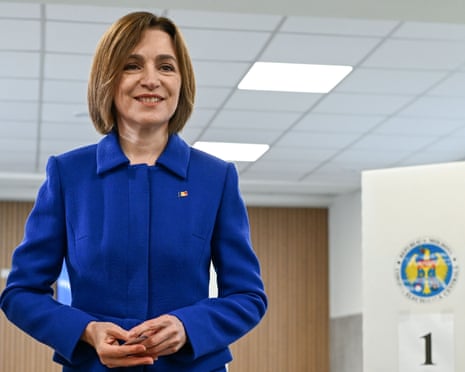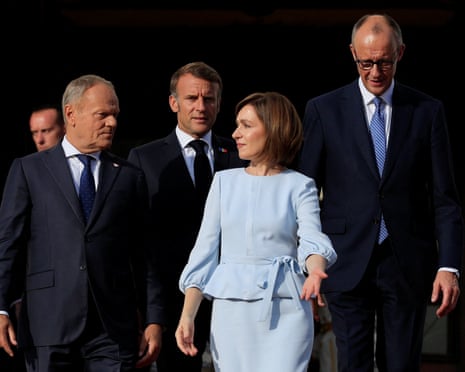Former Moldovan prime minister Natalia Gavrilița is speaking at the Warsaw Security Forum this morning.
Responding to last night’s election result, she says:
“We all need good news, and I’m very, very happy that my people delivered the good news and demonstrated resilience in the face of very aggressive hybrid attacks.
We [faced] massive disinformation campaigns, … corruption of voters, … very organised interference in the diaspora, … cyber-attacks so the entire host MD domain yesterday was closed because of that, and [yet] we have a clear result.”
She adds:
“Of course, the fight is not over. Of course, we are very determined to carry out the reforms with all the challenges and capacity constraints and so on. But today we celebrate.”
She warns that Moldova “has long been a testing ground for hybrid war attacks” tested and later applied elsewhere.
-
'Russia will not be drawing new borders in Ukraine,' Zelenskyy says
-
'Ukraine must join the EU and it will,' Zelenskyy says
-
'Russia is testing how far it can go,' Zelenskyy says responding to recent Russian airspace violations
-
Russia 'failed to destabilise Moldova' and its 'subversive influence' will not spread further, Zelenskyy says
-
Poland's Tusk soberly warns Europe faces 'a new type' of war
-
'Fight is not over, ... but today we celebrate,' former Moldovan prime minister says
-
Moldovans chose 'democracy, reform and European future,' EU's Costa says
-
'Tusk hails Moldova's Sandu for 'saving democracy and keeping European course'
-
'The will of Moldovan people has prevailed,' Macron says as he welcomes election result
-
Morning opening: Moldova chooses Europe
Asked about US president Trump’s position on Ukraine, Zelenskyy says “the stance of president Trump is truly balanced, and it supports Ukraine’s stance” as he pursues peace.
Commenting on Trump’s newly found seemingly hardline position towards Russia, he says:
“Our task today is to preserve the new attitude of the US towards this war and so that it corresponds to the attitude in Europe.”
Asked if he would be prepared to make territorial concessions to end the war, Zelenskyy repeats that Ukraine’s borders are defined by its constitution.
He signals some openness to “diplomatic” talks, but stresses “Russia will not be drawing new borders in Ukraine.”
In Q&A, Zelenskyy says the main weapon needed by Ukraine is “unity,” as he warns about attempts to divide Europe.
He adds that Ukraine needs more air defence systems and missiles to defend its skies, as he highlights the importance of Nato’s Purl initiative for Ukraine.
Zelenskyy also speaks about the importance of Ukraine joining the EU in the foreseeable future, as he says “Ukraine must join the EU and it will.”
“We are doing everything required, and it is important that Ukraine’s accession is not delayed by the national politics of this or that countries,” he says in a heavy swipe at Hungary.
“This is not about what we have already gone through in history. It is about what we all must avoid, and what we must avoid is any dependence on Russia,” he says.
But Zelenskyy also warns about the worsening situation in Georgia and Belarus.
“That is why we cannot afford to lose a single day or a single country. After Moldova’s election, we must keep supporting Moldova. The hardest task is to meet voters’ expectations,” he says.
“Today in Europe, the focus is on immediate threats, and they are serious, but we must not forget the long term political goals,” he says.
He references recent Russian drone incursions into Poland and Russian jets violating Estonian airspace as he warns it was “a test not only for Poland, but for all of Nato.”
Zelenskyy also claims that Russia has used tanker ships in the Baltic Sea to “launch drones that caused major disruption in northern Europe,” as he says they “should not be free to operate in the Baltic.”
“This is de facto Russia’s military activity against European countries. So Europe has the right to close straits and sea roads to protect itself,” he says.
“Russia is testing how far it can go. It wants to shift attention away from the brutal war in countries against Ukraine,” he says.
Ukrainian president Volodymyr Zelenskyy speaks next at the Warsaw Security Forum.
He pays tribute to Moldova as he says “the idea of Europe won, the idea of normal and stable national development.”
“Russia’s subversive influence will not spread further into Europe,” he says.
Russia failed to destabilise Moldova, even after spending huge, huge resources to undermine it and to corrupt whoever they could.
Speaking in Warsaw, Poland’s prime minister Donald Tusk sets out the security challenges faced by Europe, as he says that “the biggest and most important task for our opinion leaders today is to make other people, … the entire western, transatlantic community, realise: this is war.”
“We didn’t want it, it’s sometimes strange, a war of new type, but it’s still a war.”
Speaking at the same event, French Europe minister Benjamin Haddad says that Moldovans “gave us a great lesson in democracy” despite attempted interference with the democratic process.
Asked on whether the French public would support EU enlargement, he says that “for a long time, there was a form of scepticism about enlargement in France,” but “there’s been a shift in the last few years,” as people realise that extending the bloc’s influence further to Ukraine, Moldova and western Balkans “is a geopolitical necessity.”
“I’m convinced that the pressure that we’re under from the war of aggression of Russia against Ukraine and the general threat that Russia is posing to European democracies, and the economic pressures that we’re feeling from everywhere, provide the sense of urgency” to accelerate European reforms and enlargement, Haddad says.
Former Moldovan prime minister Natalia Gavrilița is speaking at the Warsaw Security Forum this morning.
Responding to last night’s election result, she says:
“We all need good news, and I’m very, very happy that my people delivered the good news and demonstrated resilience in the face of very aggressive hybrid attacks.
We [faced] massive disinformation campaigns, … corruption of voters, … very organised interference in the diaspora, … cyber-attacks so the entire host MD domain yesterday was closed because of that, and [yet] we have a clear result.”
She adds:
“Of course, the fight is not over. Of course, we are very determined to carry out the reforms with all the challenges and capacity constraints and so on. But today we celebrate.”
She warns that Moldova “has long been a testing ground for hybrid war attacks” tested and later applied elsewhere.
European Commission president Ursula von der Leyen has also congratulated Moldova’s pro-European government on its re-election.
“Moldova, you’ve done it again. No attempt to sow fear or division could break your resolve. You made your choice clear: Europe. Democracy. Freedom. Our door is open. And we will stand with you every step of the way. The future is yours.”
European Council president António Costa is joining in congratulations.
He says on X:
“The people of Moldova have spoken and their message is loud and clear. They chose democracy, reform, and a European future, in the face of pressure and interference from Russia. The EU stands with Moldova. Every step of the way.”
Poland’s prime minister Donald Tusk has also taken to social media this morning to congratulate Moldova on the election outcome.
On X, he says:
“It took real courage of the Moldovan nation and Maia Sandu personally to win this election.
Not only did you save democracy and kept the European course, but you have also stopped Russia in its attempts to take control over the whole region.
A good lesson for us all.”
Speaking of which, France’s Macron makes it clear that he is very pleased with the result in Moldova.
In a post on X, he says:
“Despite interference and pressure, the will of the Moldovan people has prevailed. France stands with Moldova in its pursuit of European aspirations and towards freedom and sovereignty.”
And now a big sigh of relief.
Despite large scale Russian attempts to interfere with its parliamentary election, Moldova has returned a pro-European government, rejecting Moscow’s attempts to force it to abandon its path to join the European Union.

With more than 99.9% of the ballots counted, Maia Sandu’s pro-western Action and Solidarity party (PAS) garnered 50.16% of the vote to elect members of the 101-seat parliament.
That compared to 24.19% for a Moscow-leaning alliance of Soviet-nostalgic parties headed by former president Igor Dodon, according to results published on the election commission’s website.
My colleague Pjotr Sauer explained that Sandu’s PAS party outperformed pre-election surveys, which had suggested it would remain the largest party but risk falling short of a majority – potentially limiting her push to deliver on a pledge of EU membership within a decade.
But the result marks a major victory for Sandu, who has staked her presidency on a pro-European course and accused Russia of deploying unprecedented underhand tactics to sway voters in the impoverished nation squeezed between Ukraine and Romania.
The result will be welcomed by Brussels and in national capitals, after EU leaders spent a significant political capital on supporting Sandu in the buildup to the closely contested vote, including a rare joint visit by France’s Emmanuel Macron, Germany’s Friedrich Merz, and Poland’s Donald Tusk last month.
I will bring you early reactions to this historic vote.

Separately, I will also look at the latest on unidentified drones flying in the Nordics, as they continued disrupting the region’s air operations over the weekend. Denmark has introduced a civilian no-drones zone overnight as it prepares for two major summits in Copenhagen later this week. Let’s see how it works in practice.
It’s Monday, 29 September 2025, it’s Jakub Krupa here, and this is Europe Live.
Good morning.